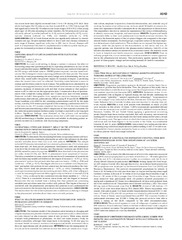Приказ основних података о документу
Occupational stress and burnout: impact on the attitudes of pharmacists in providing pharmaceutical services
| dc.creator | Jocić, D. | |
| dc.creator | Krajnović, Dušanka | |
| dc.creator | Lakić, Dragana | |
| dc.creator | Tasić, Ljiljana | |
| dc.date.accessioned | 2019-09-02T11:27:51Z | |
| dc.date.available | 2019-09-02T11:27:51Z | |
| dc.date.issued | 2012 | |
| dc.identifier.issn | 1098-3015 | |
| dc.identifier.uri | https://farfar.pharmacy.bg.ac.rs/handle/123456789/1657 | |
| dc.description.abstract | OBJECTIVES: To determine the relationship between occupational stress and burn- out of pharmacists in community pharmacies as well as the influence on the phar- macists’ attitudes about their own work with patients. METHODS: The sample included 278 pharmacists employed in community pharmacies, 172 of whom were from state and 106 from private pharmacies. Instruments used: self-assessment tests for levels of stress and burnout, and Pharmacists’ Attitudes and Beliefs Scale (PABS) created for research purposes. RESULTS: More than half of the pharmacists are under stress (56.1%), and 34.1% of pharmacists have symptoms of burnout. There is a correlation between scores on the test for self-assessment of stress levels and the following variables of PABS scale: the degree of burnout (r 0.767, p 0.01), pharmacists‘ opinion that patients take their precious time (r 0.656, p 0.01) and conflicts (r 0.516, p 0.01). The degree of burnout is correlated with the pharma- cists’ perception that patients do not understand the instructions about the ther- apy they receive from the pharmacists (r 0.701, p 0.01). Depending on the working environment (pharmacists working alone in shifts, with other colleague/s or with technicians) pharmacists differ significantly in the level of stress (F (3.274) 5.6, p 0.01), as shown by the correlation between these variables (r -0.517, p 0.01). There is a correlation between stress levels and the degree of burnout. Pharmacists who are stressed have a feeling that their patients are consuming valuable time and often came into conflict with patients. The degree of burnout is correlated with the pharmacists’ perception that patients do not understand the instructions about the therapy they receive from the pharmacists. CONCLUSIONS: The results show that the stress of pharmacists causes burnout, leading to changes in the pharmacists’ attitudes about their own work with patients. | |
| dc.publisher | Elsevier Science Inc | |
| dc.rights | openAccess | |
| dc.source | Value in Health | |
| dc.title | Occupational stress and burnout: impact on the attitudes of pharmacists in providing pharmaceutical services | en |
| dc.type | conferenceObject | |
| dc.rights.license | ARR | |
| dcterms.abstract | Јоцић, Д.; Лакић, Драгана; Тасић, Љиљана; Крајновић, Душанка; | |
| dc.citation.volume | 15 | |
| dc.citation.issue | 7 | |
| dc.citation.spage | A543 | |
| dc.citation.other | 15(7): - | |
| dc.citation.rank | M21 | |
| dc.description.other | Research poster presentations – session V | |
| dc.description.other | Disease-specific studies: Individual's health - patient-reported outcomes & patient preference studies | |
| dc.identifier.wos | 000312411101500 | |
| dc.identifier.doi | 10.1016/j.jval.2012.08.1911 | |
| dc.identifier.fulltext | http://farfar.pharmacy.bg.ac.rs/bitstream/id/10423/Occupational_stress_and_pub_2012.pdf | |
| dc.type.version | publishedVersion |

